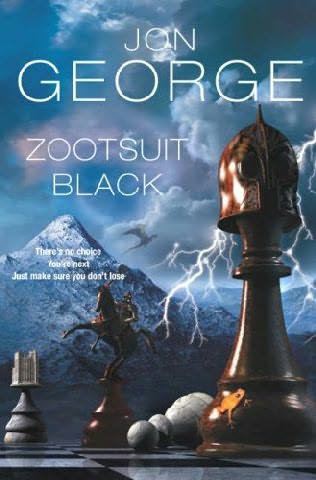

The premise of this novel is that in seven days time the human race will face the possibility that it will no longer exist. Centered on two men, the brilliant young scientist, Dr. Jake Crux, and a gameshow contestant named Scott Anderson, we are to witness the gradual understanding as to how an indifferent universe deals with a human collective consciousness brought to saturation point.
Ever since a worldwide event which affected every living person the planet's denizens have become frightened, angry, even more suspicious, and downright hostile to science. They have every reason to be as everyday folk slip into alternate realities where they face challenges they are totally unprepared for. The novel's central protagonists encounter their own alternate realities and strongly that their temporary forays into these realms is tied into a greater cosmic scheme.
From the starting pages Zootsuit Black intrigued me with its originality and accessibility. Scott relives dreams of WWII, a place where the fire bombing of Hamburg haunts first his dreams, then his waking life. He later becomes convinced that he is destined to kill a high ranking Nazi official in this alternate reality in order to save himself in his "real" life. Dr. Jake Crux ends up battling mythological creatures and cannot figure out what it is he is meant to be doing.
Jake's work with mice has brought him to the conclusion that human beings are somehow inveigled to use an unused portion of their mind that is supposedly tied in with a dormant ESP. His conclusions frighten him, but all his work points to the fact that the worlds' population is on the brink of mutual annihilation through no conscious effort of its own doing.
This novel, while not exactly a taxing read, was enjoyably refreshing to experience. The characters are moderately believable, there was too swinging to and fro for me to truly identify with either of them. The first half of the novel is a much better read as the tension and horror that an unsuspecting populace rapidly loses itself to with their fears being exploited is recounted via newscasts, and experienced firsthand by the doctor via acts of terrorism committed by techno-phobes. The second half of the novel tapered away slightly as the realisation that the responsibility for the disappearances of people is lost in a higher power - it felt like a plot cop-out.
Recommended as a light and enjoyable read for a rainy weekend.

| Authors | Awards | Blogs |
| Fanzines | Index | Magazines |
| Publishers | Retailers | Reviews |